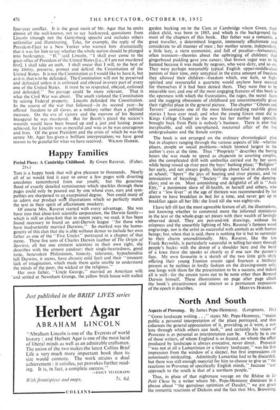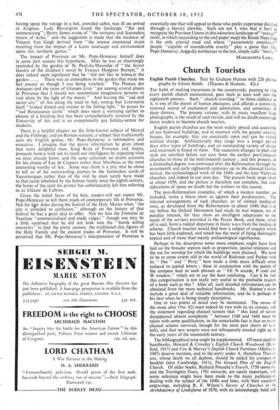• North And South
Aspects of Provencg. By James Pope-Hennessy. (Longmans. 18s.) "Goon landscape writing . . ." states Mr. Pope-Hennessy, "makes public a personal interpretation of the place portrayed, and thus enhances the general appreciation of it, providing, as it were, a new lens through which others can look," and certainly his vision of Provence is as personal as interpretation can be. Clearly he is one of those writers, of whom England is so fecund, on whom the effect produced by landscape is always evocative, never direct. Provence "was not at all a Lamartinian or a literary landscape," was his first impression from the window of a sleeper, but first impressions are notoriously misleading. Admittedly Lamartine had to be discarded, but there was still enough material for him to choose to give us "the reactions to Provence of specifically English minds," because "our approach to the south is that of a northern people."
Thus, in place of that nightmare voyage on the Rhone in Le Petit Chose by a writer whom Mr. Pope-Hennessy dismisses in a phrase about "the garrulous optimism of Daudet," we are given the romantic reactions of Dickens and the fact that Mrs. Browning, having spent the voyage in a hot, crowded cabin, was ill on arrival at Avignon. Lady Blessington found the landscape "flat and uninteresting"; Henry James wrote of "the tortuous and featureless streets of Arles," and the suggestion is made that the madness of Vincent Van Gogh derived from "the intense emotional strain resulting from the impact of a Latin landscape and environment upon this northern genius."
The impact of Provence on Mr. Pope-Hennessy himself does in some part sustain this hypothesis. After he was so charmingly reminded by the garden of St. Paul-du-Mausolee of " the Secret Garden of the children's novel by Frances Hodgson Burnett," it does indeed seem significant that he "did not like to loiter. in the garden .. .. There was an atmosphere in the garden that made me feel uneasy as though I was being watched," The Plateau des Antiques and the ruins of Glanum Livii "are among several places in Provence that I should not recommend imaginative persons to visit alone by the light of the moon." And leaving the "sad and secret city" of Aix along the road to Apt, noting that Lourmarin itself "looked dismal and sinister in the failing light," he passes its "sad Renaissance castle" which does seem a worrying epithet to choose of a building that has been sympathetically restored by the University of Aix and is an exceptionally gay holiday-centre for students.
There is a helpful chapter on the little-known subject of Mistral and the Felibrige; and on Roman remains, a subject that traditionally suits the English genius, Mr. Pope-Hennessy is informative and evocative. I imagine that the sparse information he gives about that most delightful man, King Rene of Provence and Anjou, proceeds from a wish not to insult our intelligence by repeating what we must already know, and the same solicitude no doubt accounts for his choice of Luc de Clapiers rather than Mirabeau as the most interesting worthy of Aix. Some may think it a pity that he chose to tell us of his unrewarding journey to the featureless castle of Vauvenargues rather than of the visit he must surely have made to that castle inhabited by the Sabran family since the eighth century, the home of the saint his printer has unfortunately left him referring to as Eleazar de Cabran.
Given the initial focus of his lens, readers will not expect Mr. Pope-Hennessy to tell them much of contemporary life in Provence. Not for VI Arles during the festival of the Holy Maries when "the city is crowded to confusion," although on the history of that festival he has a great deal to offer. Not for him the Fontaine de Vaucluse "commercialised and made vulgar," though one may be a little surprised that he did not look into the "booth selling souvenirs" to find the pretty santons, the traditional clay figures of the Holy Family and the ancient trades of Provence. It will be perceived that Mr. Pope-Hennessy's interpretation of Provence is essentially one that will appeal to those who prefer experience distilled through a literary alembic. Such am not I, who find it hard to recognise the Province I know in this odourless landscape of "orange" roofs, in which (according to the end-paper map) the Route Napoleon is the only arterial road and where "passionately emotional" people "capable of considerable cruelty" play a game that Mr. Pope-Hennessy, doggedly northerner to the last, simply calls "bowls."
MARGHANITA LASKI.



































 Previous page
Previous page